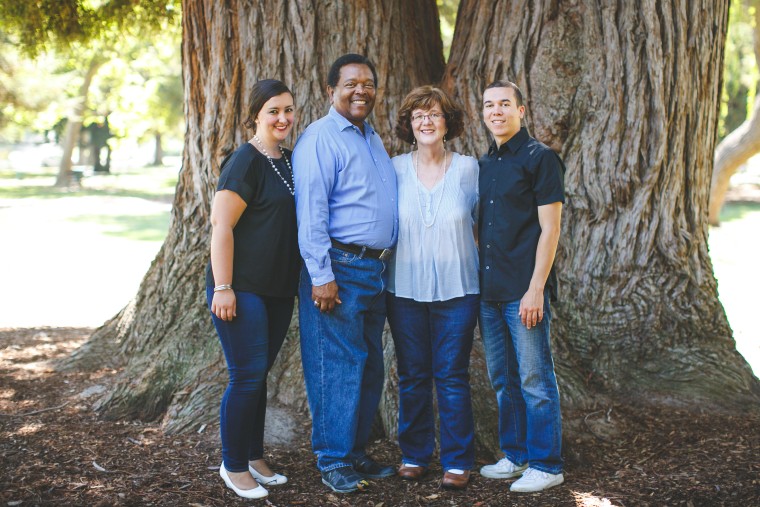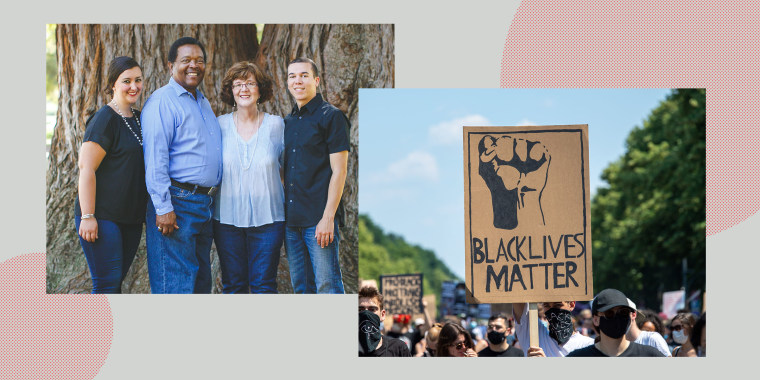As a biracial Black and white woman with white skin and brown wavy hair, does my anger in response to the countless racist murders taking place across our country even matter? Because of how I look, I find myself questioning whether the pain I feel right now should even be acknowledged.
Over the past few weeks, I have received countless emails and Twitter messages from other biracial people — some friends, others complete strangers — asking for guidance in thinking about their own identities. One said, “I have always identified as Black, but these past few weeks have made me feel so white that now I’m questioning if I ever should have identified as Black because maybe I am too white-looking to claim that part of me.”
For more stories like this, follow TMRW x TODAY on Instagram.
In response, this piece is written for Black/white biracial people who might be feeling like they are sitting on the sidelines of the Black Lives Matter movement, wondering how to contribute to this fight. With the biracial population being the fastest growing youth group in the U.S., there is no doubt in my mind that there are countless people questioning what their role is in this fight against white supremacy.
Black people in our country face racism every day and are killed at disproportionate rates compared to other groups. This piece should not take away the focus from the needed narratives of the Black community and the actions we all need to take to dismantle American systems of oppression — we need to learn and listen from Black people. Instead, this piece serves as a call to action for biracial people, especially Black/white biracial individuals, to stand up for your families because you too have a direct connection to this moment. This is the time for all of us to stand up and fight.
Do I have to choose a side?
So why do biracial people feel like they have to choose a side? Simply put: racism. Our outward appearances often determine how much and the type of discrimination we may or may not face. Basically, the more “Black” you look, the more racism and discrimination you will likely face. No one would ever guess that I am the daughter of a Black father and a white mother. I look “white.” So I am often treated as a white person. And yet, I was raised primarily by the Black side of my family. This is why it is so important for me to identify as both Black and white, regardless of whether either side understands or accepts it. This is how I have identified my whole life.

Being Black, white and biracial is what compelled me to study how we see and categorize our social world. For over a decade, I have been studying multiracial experiences, cross-race interactions and how social identity threat shapes our behavior. Perhaps it was seeing how differently my father and mother were treated across my life, like when we went out to dinner with the bill always being handed to my white parent over my Black parent. Or maybe the fact that my Black parent was worried about attending my honor roll banquets during middle school at the local country club for fear of being a target of prejudice. Of course, these lived experiences have shaped my views. And even though my white skin is always salient and present unlike a darker-skinned Black person who could never choose when to disclose their Blackness, my whiteness is and will always be inherently linked to my Blackness.
I am Black.
Last week, I received an email from an undergraduate student asking me to be a moderator for an upcoming Black student-athlete event featuring students discussing their racist experiences on our predominately white campus in response to the recent Black Lives Matter protests. At first, I was thrilled that Black students on my campus felt connected enough to me to invite me to share this space with them. But moments later, that excitement morphed to doubt because of the color of my skin.
Would my presence be another white reminder for students of color, hindering their abilities to speak freely? Am I just too white-looking to do this?
I quickly texted a Black friend and colleague to ask him if I should agree to participate in the event. His response: “Yes, Sarah! You are Black and the students know you and your work.”
Those words “You are Black” are not ones that I have heard very often across my life, except in the form of an incredulous question after disclosing my identity to someone else. Are you sure you are Black? Are you the milk man’s kid? Those are the phrases I was used to hearing.
So when my colleague said that combination of words — "You are Black" — it completely validated my identity and sense of belonging and reminded me why this too is my fight. I know I cannot ever claim to have lived the Black experience, but nevertheless, I am Black, and I should be at that event and I am ready to fight anti-Blackness.
Growing up biracial
This experience reminded me of the stories my Black grandmother — a light-skinned woman with a complexion much like mine — told me while I was growing up. In fact, family members often said I resembled her, which created a particularly special connection. My grandmother was the one who always went to the grocery store and ran all of the errands because as she put it, “It is just what I need to do.” It was because my grandfather, who was much darker-skinned, simply couldn’t navigate the world as easily without fear of experiencing discrimination and racism.

I was also reminded of a time when I was driving home from elementary school in Sacramento, California, with my Black father. I watched white nationalist skinheads throw rocks only at his side of the car, not mine. As a little girl, I felt this strong need to protect my dad or to speak up and yell at those skinheads on behalf of him, and yet I was under the age of 10. No matter how much love I had for my dad, my white skin in that moment could not help me protect him. This is the same fear that racial and ethnic minorities feel every day across the U.S. — the fear of losing someone you love because of the color of their skin. I was not scared for my own safety, I was scared for the safety of my family. They are my specific Black Lives (that) Matter.
Reconciling my own duality
Across my life, I have learned that my white (skin) privilege is a benefit, but I also still have a responsibility to my family. I have realized that I am in a unique position to advocate for change including engagement with anti-racism efforts. I have been privy to insights from Black and white people and that exposure has given me another privilege: the ability to not only get a seat at the table where decisions are made but also the ability to speak up effectively for those who can’t.
You see, I am less threatening in white spaces because of the color of my skin. Being able to use my identity in positive ways has made me feel whole and has given me my sense of purpose. Advocating for Black students, pushing for needed conversations about discrimination on my campus, teaching courses that force students to think a little differently — these are the actions that have allowed me to function these past few weeks as I continue to work on hate and bias committees and teach racial awareness sessions to elementary schools. I guess this is my way of reconciling the duality of having privilege with responsibility. And as my grandmother put it, it is just what I need to do. This is my way of helping that young girl protect her father.
So here’s my message for other biracial people who may be wondering if their feelings are valid: You are Black. I hear you, I see you and your hurt and pain matters. But as former Spelman College President Dr. Beverly Daniel Tatum said, “It is important to understand that the system of advantage is perpetuated when we do not acknowledge its existence.” So understand your own privilege, but also recognize your own unique opportunities to create change when and where it is needed most. Recognize your own responsibility to end racism and dismantle anti-Blackness rhetoric not only for the Black community but also for your own families.



